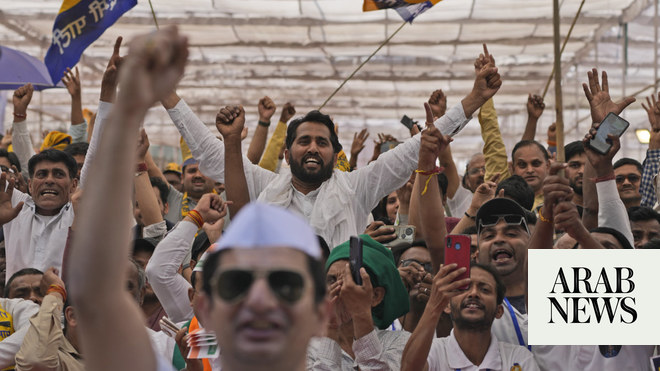
Indian Prime Minister Narendra Modi spent much of last week in the UK. Notionally he was there as the star of the Commonwealth Heads of Government Meeting — a conclave of 53 disparate nations with the theme “Our Common Future” would seem a charade without high-level participation from its biggest country. But there was much more to Modi’s visit than that. It was two-and-a-half years since Modi last visited the UK, but his arrival this time felt like a changing of the guard in geopolitical terms, marking a definitive reversal in the balance of power between Britain and the one-time jewel of its empire.
This year, India is projected to become the fifth-largest economy in the world. The nation it will displace on that list is the United Kingdom. By 2050, India will likely be third, behind only the US and China. Meanwhile, with many of its European allies in a post-Brexit vote sulk, the UK remains a world power in decline, more in need of India as a trade and diplomatic partner than ever.
So it was no surprise the British state went out of its way to court the Indian PM. Modi’s counterpart Theresa May made abundant room for him on her schedule, as the UK wants to negotiate a new free-trade deal with India. Prince Charles took him to the London Science Museum. Even the Queen invited him to tea. No stranger to the power of photo ops, Modi conducted himself on all these occasions with maturity, poise and gravitas.
Everything about the week was a grand success — that is, as long as no one cared to read the newspaper headlines back home in India. For a few weeks now, India has been reeling from the accounts published in newspapers of two shocking instances of sexual violence that appear to have taken place with the complicity of state actors.
In one, an eight-year-old girl from a community of Muslim nomads in Jammu and Kashmir was kidnapped, sexually assaulted for several days, and finally murdered. When news of the incident broke, events quickly took on a communal colour. Remarkably, two ministers from Modi’s BJP party, which is part of the ruling coalition in the state, chose to attend a rally in support of the accused, all Hindus. They were later sacked.
The India that Modi took to the UK was one that has ripped up every advance made since independence.
Chandrahas Choudhury
In the other incident, a 17-year-old woman in Uttar Pradesh, India’s most populous state and one also ruled by the BJP, tried to set herself on fire earlier this month. This act of desperation was the final straw after a fruitless search for justice. Last year, she alleged she had been raped by a member of the legislative assembly when she had gone to him in search of a job. When she reported the incident to the police, the consequences were dire. They arrested not the accused but the victim’s father, who was beaten up and later died in police custody. Only after the story made headlines was the accused himself taken into custody.
These cases are not isolated incidents. Rather, they show the resurgence under the present regime of the forces of darkness — rampant misogyny, sadistic sexual violence, contempt for the rule of law and the rights of the defenseless, and contempt for the powerless and the vulnerable — that for so long debilitated Indian social life and made it a nightmare for millions of vulnerable people, particularly women and lower castes. The teenage girl in Uttar Pradesh had gone to the politician looking for a job; so much for wanting to work in the growing economy of Modi’s India.
When these tragic incidents are added to the scores of murders and assaults that have taken place in the last four years on the issue of the consumption of beef — another core item on the BJP’s agenda — it seems that any Indian citizen who is poor, low-caste, female, or from a minority must walk, work and eat with their heads down for fear of attracting the attention of the mob.
And, as with those past incidents, Modi’s reaction to these shocking new revelations — and the ideological wars now being waged in their wake — has been underwhelming and unpersuasive. The idea of an India consisting of an “us” and a “them” is built into his party’s DNA, and this foundational reality trumps any rhetoric the PM wields in the world about creating a united India.
Modi’s visit to the UK, then, might point to another pattern in history. After all, the political chaos that Britain left behind on India’s independence, particularly with respect to the Hindu-Muslim question, led to the formation of the hostile states of India and Pakistan, and the bloodbath of partition. Much of independent India’s constitutional architecture was an attempt to purge the country of the canker of religious hatred and to create a new sense of Indian identity that would forge the bonds of solidarity and fraternity necessary in a democracy.
Seven decades on, PM Modi has, more than any other politician in independent India, presided over the state and party-sponsored return of civil life in India to the toxic climate of fear and chauvinism that once convulsed the entire subcontinent. Say what you like about the economy — in the moral sphere, the India that Modi took to the UK last week was one that has ripped up every advance made since the time the Union Jack was lowered in New Delhi.
• Chandrahas Choudhury is a writer based in New Delhi, most recently the author of the novel “Clouds” (Simon & Schuster, 2018)












